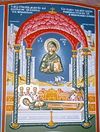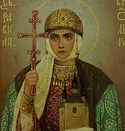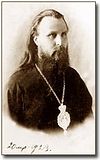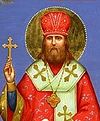

| Previous day | Next day |
| Old Style
July 11
|
Sunday |
New Style
July 24
|
| 6th Sunday after Pentecost. Tone 5. | No fast.
|
![]() Commemoration of the Miracle of Great-martyr Euphemia the All-praised, of Chalcedon (451).
Commemoration of the Miracle of Great-martyr Euphemia the All-praised, of Chalcedon (451). ![]() Blessed Equal-to-the-Apostles Olga, princess of Russia, named Helen in holy baptism (969).
Blessed Equal-to-the-Apostles Olga, princess of Russia, named Helen in holy baptism (969). ![]() Uncovering of the relics of Hieromartyr Hilarion, archbishop of Verey (1998).
Uncovering of the relics of Hieromartyr Hilarion, archbishop of Verey (1998).
Hieromartyr Cindeus, priest, of Pamphylia (283-305). St. Arcadius, monk, of Vyazma (ca. 1592).
Martyrs Januarius and Pelagia, of Nicopolis in Armenia (ca. 310). St. Drostan of Old Deer and Aberdeen (Scotland) (6th c.). St. Nicodemus of Hilandar and Vatopedi, Mt. Athos, instructor of St. Gregory Palamas (1320). New Martyr Nicodemus of Elbasan and Mt. Athos (1722). New Monk-martyr Nectarius of St. Anne’s Skete, Mt. Athos, at Vryoulla, Ephesus (1820). St. Cyril, monk, of Paros (1833). New Hieromartyrs Momcilo Grgurevic, Dobroslav Blazenovic, Milan Bozic, Mihailo Djusic, Jovan Zecevic, Bozidar Jovic, Bogdan Lalic, Trifun Maksimovic, Velimir Mijatovic, Bozidar Minic, Miladin Minic, Marko Popovic, Dimitrije Rajanovic, Budimir Sokolovic, Relja Spahic, Lazar Culibrk, Savo Siljac, Savo Skaljka, Milorad Vukojicic, Ratomir Jankovic, Mihailo Jevdjevic, Dusan Prijovic, Dobrosav Sokovic, Nestor Trkulja, Serafim Dzaric, Andrija Siljak, Slobodan Siljak, and Jovan Rapajic, priests, of Serbia (1941-1945). St. Leo, monk, of Mandra.
Repose of cave-dweller Anastasia of St. Cornelius of Padan Hermitage in Olonets (1901).
Thoughts for Each Day of the Year
According to the Daily Church Readings from the Word of God
By St. Theophan the Recluse

Sixth Sunday After Pentacost. [Rom. 12:6-14; Matt. 9:1-8]
The Lord forgives the sins of the man sick of the palsy. One should rejoice; but the evil mind of the learned scribes says: “This man blasphemeth.” Even after the miracle of the healing of the man sick of the palsy—a confirmation of the comforting truth that the Son of man hath power on earth to forgive sins—the people glorified God; but nothing is said about the scribes, probably because they continued to weave their deceitful questions even after such a miracle. The mind without faith is a schemer; it constantly hammers out its evil suspicions and weaves blasphemy against the whole realm of faith. As for miracles—it either doesn’t believe in them, or it demands a tangible one. But when a miracle is given that would obligate one to submit to the faith, this mind is not ashamed to turn away from it, distorting or slandering the miraculous works of God. It treats irrefutable evidence of God’s truth in the same way. It is sufficiently and cogently presented with both experiential and intellectual proof, but it covers even this with doubt. Sort out all that it produces and you will see that in this there is only deceit, although its own language calls it cleverness, and you are unwillingly led to the conclusion that cleverness and deceit are one and the same. In the realm of faith the Apostle says, We have the mind of Christ. Whose mind is outside of the realm of faith? The evil one’s. That is why deceit has become its distinguishing characteristic.
Articles
 Venerable Arcadius of NovotorskSaint Arcadius of Vyazma and Novotorsk was from the city of Vyazma of pious parents, who from childhood taught him prayer and obedience. |














